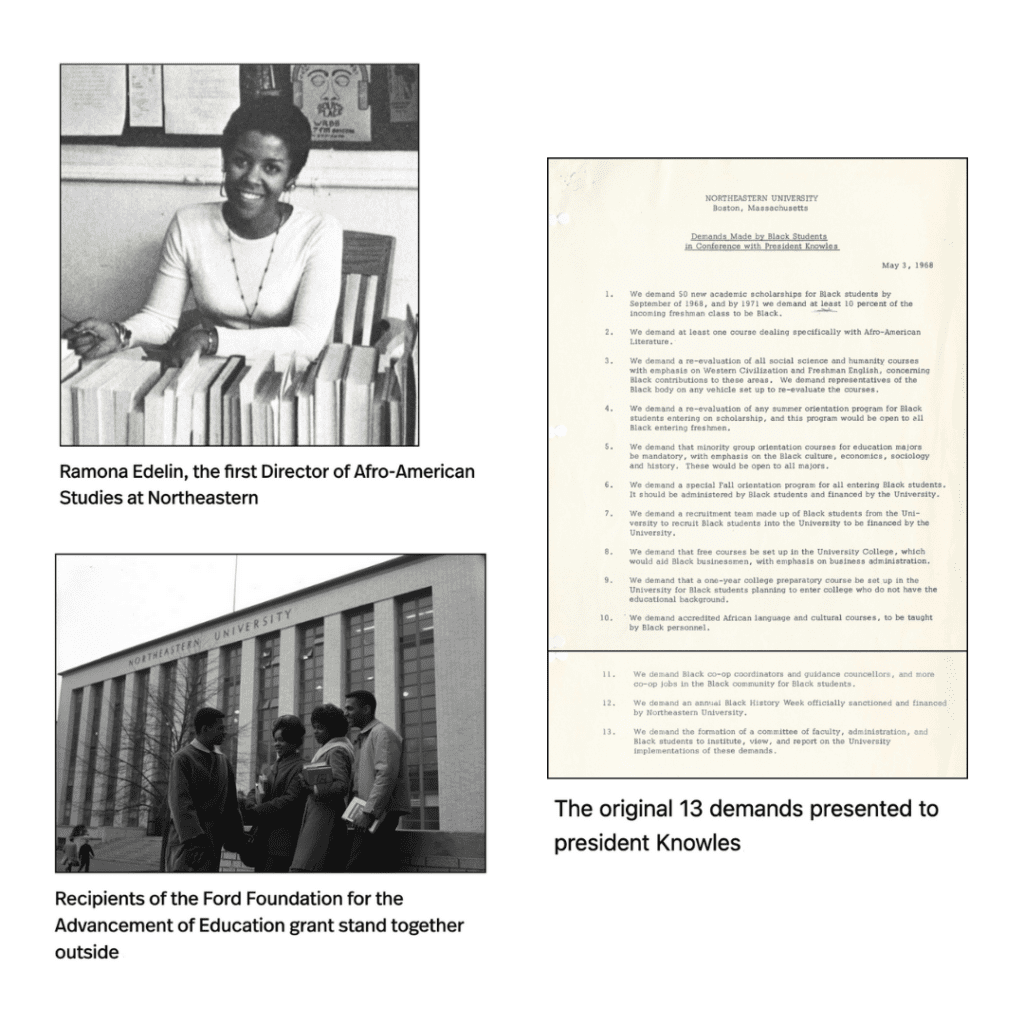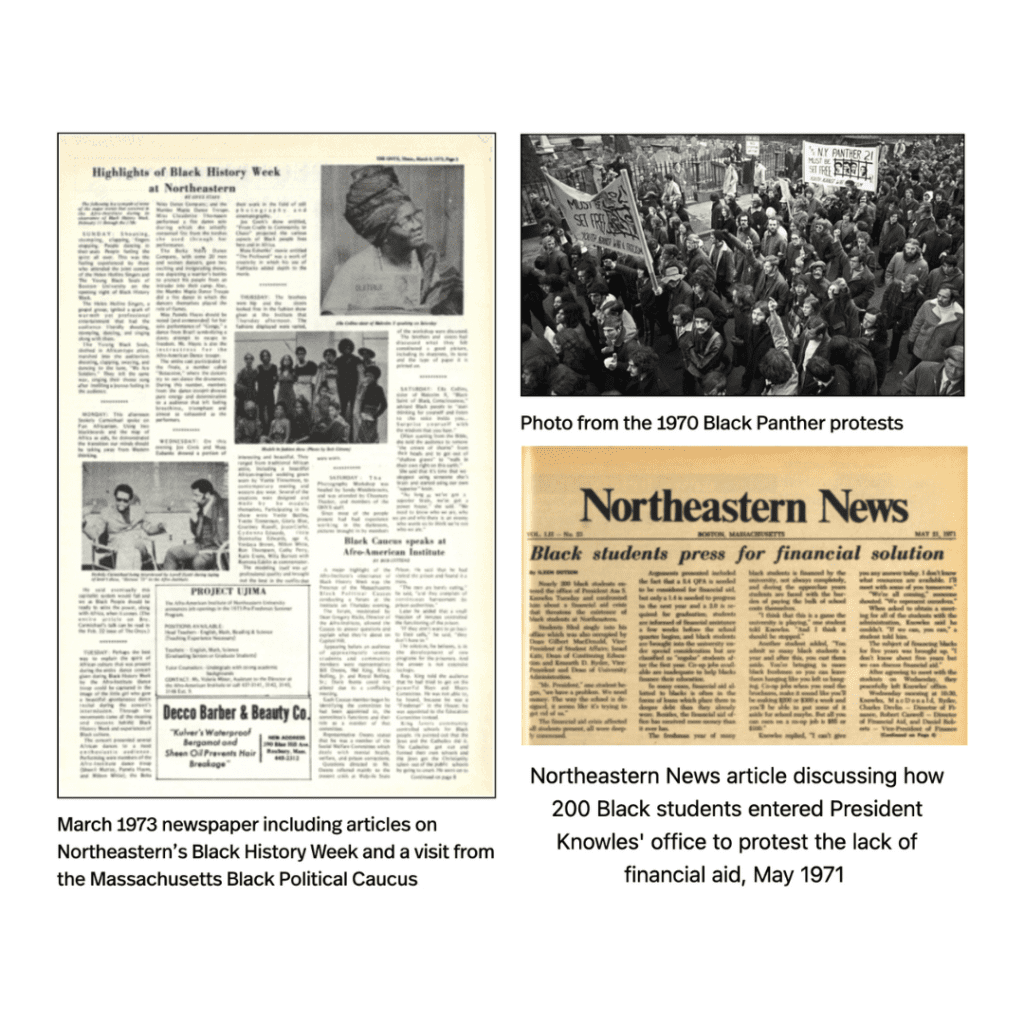Program History
Play the short video above to see a timeline of the program’s history. More information can be found further down this page.
All images are were obtained from the John D. O’Bryant African American Institute and the Northeastern Digital Repository. Special thank-you to Simonne Ronk for providing the images and captions, as well as student and co-op Savita Maharaj for compiling this information.
The Africana Studies program at Northeastern University has taken many forms in the past 50 years. We are deeply indebted to the students, faculty, administrators and community members who have been instrumental in building a strong foundation for us to exist today. We would not be here without the past and present contributions of students and faculty who helped to secure funding and institutional support for the program’s development. The program would not be what it is now without over half a century’s worth of tireless campaigning, organizing, and strategizing led by student activists and propelled community partners.
A Foundation Built by Student Activism
It is necessary to note that many of the 13 demands originally presented by the Black students Ms. Williams and Messrs. Hazelwood, Farrar, Evans, and Peace to President Knowles in 1968 remain either unfulfilled or inconsistently maintained by Northeastern, and there is always work left to be done in order to assure true financial and social equity for Black students and faculty. The video and timelines shown above and at the bottom of this page illustrate just a few of the many efforts by students and activist groups to petition Northeastern for improved financial aid, breadth of courses, community resources, and faculty representation for Black students.


A Commitment to Social Justice & Community Engagement
Northeastern University is located in Roxbury, which has been the heart of Boston’s Black community for several centuries and is the home of many activists, artists, and leaders, such as former Mayor of Boston Kim Janey. This positioning allows us to build and maintain partnerships with a variety of non-profit organizations, civic institutions, and Black-owned businesses. Northeastern’s relationship with Roxbury has been and still is fraught, but the Africana Studies Program is devoted to working alongside and learning from Black Bostonians who have given so much to this city. We aim to do so through community partnerships with organizations like Frugal Bookstore, Greater Roxbury Arts and Cultural Center (GRACC), and Embrace Boston among others. We also have an open door programming policy through which all of our events are accessible to the wider community, not just those within the university.
Black Feminist Institution Building
In 1977, the Combahee River Collective declared that “if Black women were free, it would mean that everyone else would have to be free since our freedom would necessitate the destruction of all the systems of oppression.” The Africana Studies Program is and has been devoted to espousing Black feminism in theory and praxis through our teaching, programming, and research. We have a Black Feminist Studies Minor, and our intersectional lens applies to course curricula, syllabi, and events planning. Since 2021 we have hosted the annual “bell hooks symposium” in honor of its namesake, Black feminist trailblazer bell hooks, which invites scholars from all over the country. We are also proud of our 2 year-long Postdoctoral Fellowship position in Black Feminist Studies, for which Dr. AK Wright was the Inaugural Postdoctoral Fellow in 2021.


An Interdisciplinary Approach
The field of Black Studies, which gave birth to Africana Studies, is deeply interdisciplinary. At Northeastern, academic work in Africana Studies can be combined with courses from other academic programs and colleges beyond CSSH, allowing students to study a variety of fields and disciplines as they engage Africana Studies.
Our Campus Partners
Africana Studies is able to provide the programming it does thanks to support from other Northeastern institutions. Its history is closely linked with that of the John D. O’Bryant African-American Institute, which provides resources for Black students to succeed academically while building community. Events are frequently planned along and cosponsored by the JDOAAI as well as programs like WGSS, the History Department, and the Center on Crime, Race, and Justice, among many others.

Thank you to co-op student Maya Baumann for writing and compiling the text and images for the website, as well as co-op student Savita Maharaj for creating the video and pamphlet. Images were sourced from the Northeastern Digital Repository, the History Project, Wikimedia Commons, and “African American Activism and Experience at Northeastern, 1963-1978,” a Northeastern University Libraries online exhibition.